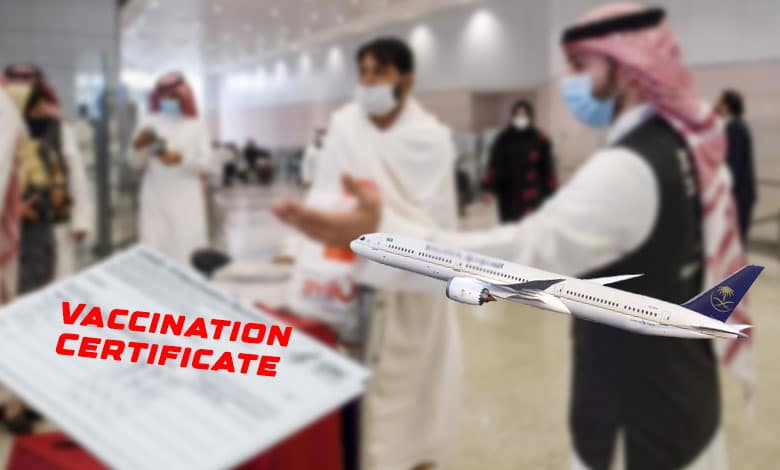Traveling to Saudi Arabia? These Vaccination Certificates Now Mandatory for Hajj and Umrah Also– Check Full Details

The Saudi Ministry of Health has updated its vaccination requirements for international travelers, with particular focus on individuals traveling to and from Saudi Arabia, including pilgrims for Hajj and Umrah. The new measures aim to ensure the health and safety of travelers, while preventing the spread of infectious diseases both within the Kingdom and internationally.
Table of Contents
Yellow Fever Vaccination: Strict Protocols for Travelers
For travelers arriving in Saudi Arabia from countries with ongoing yellow fever transmission, vaccination is required for all individuals over 9 months of age. This applies under the International Health Regulations (IHR) of 2005. Proof of vaccination is not necessary for passengers who spend less than 12 hours in transit within Saudi airports. The vaccination certificate is valid for life, ensuring that individuals who have been vaccinated once are protected for future travels.
For travelers departing from Saudi Arabia to yellow fever-endemic areas, vaccination is highly recommended. Travelers are advised to carry an International Certificate of Vaccination to ensure smooth entry into countries with yellow fever transmission risks. Travelers without proper documentation may face restrictions at entry points.
Also Read: Middle East Leaders Reject Trump’s Proposal to “Take Over” Gaza; What’s Next
Polio Vaccination: Essential for Long-Term Visitors
For individuals traveling to Saudi Arabia from countries with active wild poliovirus (WPV1) or circulating vaccine-derived poliovirus (cVDPV), a dose of the bivalent oral polio vaccine (bOPV) or inactivated poliovirus vaccine (IPV) must be taken. This vaccine should be administered at least 4 weeks prior to departure. Urgent travelers, who need to travel within 4 weeks, should receive the vaccine by the time of departure.
Similarly, travelers departing from Saudi Arabia to regions where polio is prevalent should ensure their vaccination status is up-to-date. A visit to a travel clinic is recommended to update vaccination before international travel, ensuring protection against polio and avoiding health risks.
Meningococcal Meningitis: Mandatory for Pilgrims
The Ministry has emphasized that all individuals over 2 years of age planning to visit Saudi Arabia for Umrah, Hajj, or seasonal work in the Hajj zones must have a valid meningococcal vaccine certificate. The vaccine must be administered at least 10 days prior to arrival. Both quadrivalent polysaccharide and conjugate vaccines are acceptable, with the latter being recommended for those over 55 years of age.
Pilgrims must ensure that they meet these vaccination requirements to enter the Kingdom, with strict enforcement at points of entry. Authorities urge all travelers to consult their health care provider before traveling to ensure they are up-to-date with all necessary vaccines, particularly for meningitis.
Pre-Travel Health Consultations: A Must for Travelers
The Saudi Ministry has also highlighted the importance of pre-travel health consultations for all travelers. These consultations are essential for reviewing and updating immunizations, particularly for high-risk individuals. Vaccines for diseases such as hepatitis A and B, cholera, Japanese encephalitis, typhoid fever, and rabies may be necessary depending on the traveler’s destination.
Routine vaccines like tetanus, measles, mumps, rubella, and flu shots should be checked and updated for infants, children, adolescents, and adults alike.
Future Measures: Preparedness for Health Emergencies
In the event of an international health emergency, such as an outbreak of a disease of global concern, the Ministry of Health may impose additional precautions for pilgrims coming from affected regions. These measures will be implemented in coordination with the World Health Organization (WHO) to prevent the spread of infections among Hajj and Umrah pilgrims. This proactive approach is aimed at protecting the health of both pilgrims and residents of Saudi Arabia.
Food Entry Restrictions: Tightened Regulations
As part of the health measures for incoming pilgrims, Saudi authorities have imposed restrictions on the food items that can be brought into the Kingdom. Only sealed, packaged food items will be allowed entry, and these must be easy to inspect. This regulation ensures that potentially harmful or contaminated food does not enter the country, safeguarding the health of pilgrims and the general population.
Final Thoughts
With millions of pilgrims traveling to Saudi Arabia for Hajj and Umrah each year, the Ministry of Health has emphasized the importance of ensuring vaccination compliance and adopting health measures. These protocols aim to mitigate the risks of infectious diseases and ensure the health of both travelers and the local population, further solidifying Saudi Arabia’s commitment to safe and secure pilgrimages.
